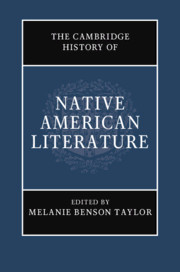Book contents
- The Cambridge History of Native American Literature
- The Cambridge History of Native American Literature
- Copyright page
- Contents
- Figures
- Contributors
- Introduction: What Was Native American Literature?
- Part I Traces and Removals (Pre-1870s)
- Part II Assimilation and Modernity (1879–1967)
- Part III Native American Renaissance (Post-1960s)
- Part IV Visions and Revisions: 21st-Century Prospects
- 23 Native American Horror, Fantasy, and Speculative Fiction
- 24 Charting Comparative Indigenous Traditions
- 25 The Global Correspondence of Native American Literatures
- 26 Indigenizing the Internet
- 27 Indigenous Futures beyond the Sovereignty Debate
- 28 The Leftovers
- 29 Can You See the Indian?
- Index
- References
25 - The Global Correspondence of Native American Literatures
from Part IV - Visions and Revisions: 21st-Century Prospects
Published online by Cambridge University Press: 18 September 2020
- The Cambridge History of Native American Literature
- The Cambridge History of Native American Literature
- Copyright page
- Contents
- Figures
- Contributors
- Introduction: What Was Native American Literature?
- Part I Traces and Removals (Pre-1870s)
- Part II Assimilation and Modernity (1879–1967)
- Part III Native American Renaissance (Post-1960s)
- Part IV Visions and Revisions: 21st-Century Prospects
- 23 Native American Horror, Fantasy, and Speculative Fiction
- 24 Charting Comparative Indigenous Traditions
- 25 The Global Correspondence of Native American Literatures
- 26 Indigenizing the Internet
- 27 Indigenous Futures beyond the Sovereignty Debate
- 28 The Leftovers
- 29 Can You See the Indian?
- Index
- References
Summary
U.S. Native American literature corresponds in the first instance with the anticolonial literatures of what used to be called the Third World. As such its periodization cannot be made to fit within the periodizations of U.S. American literature, either in terms of centuries or moments (modern/post-modern). More properly, one might begin to think of this literature, if one wants to periodize it at all, in terms of pre-and post-invasion. In this paper, I look at one instance of this correspondence of resistance in Acoma poet Simon Ortiz’s Fight Back: For the Sake of the Land/ For the Sake of the People and Palestinian poet Mahmoud Darwish’s Journal of an Ordinary Grief. I undertake this project both to reorient our thinking about the global place of U.S. Native American Literature and to think about the way this reorientation effects the hegemony of the current periodization of U.S. American literature.
Keywords
- Type
- Chapter
- Information
- The Cambridge History of Native American Literature , pp. 465 - 480Publisher: Cambridge University PressPrint publication year: 2020

